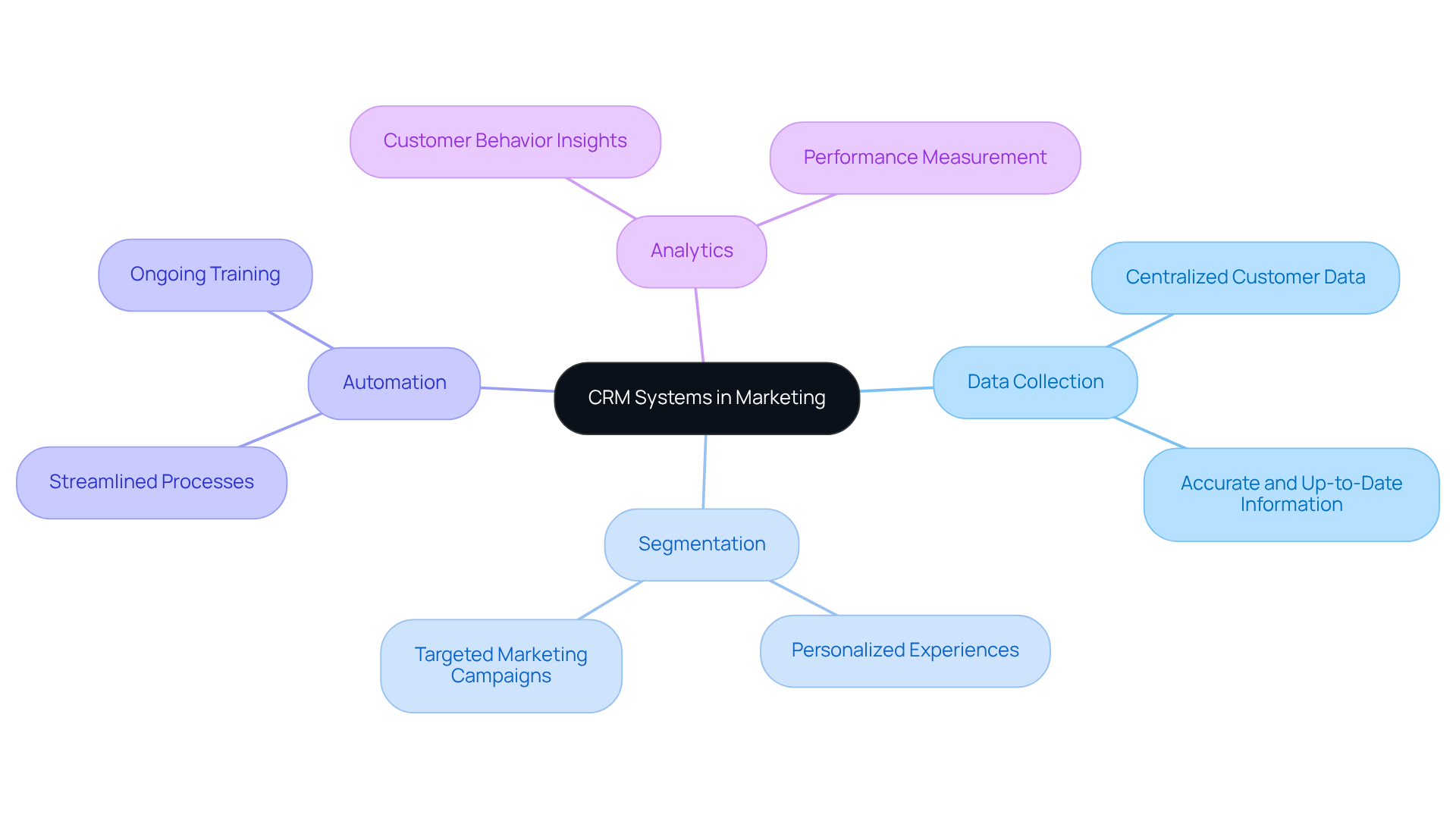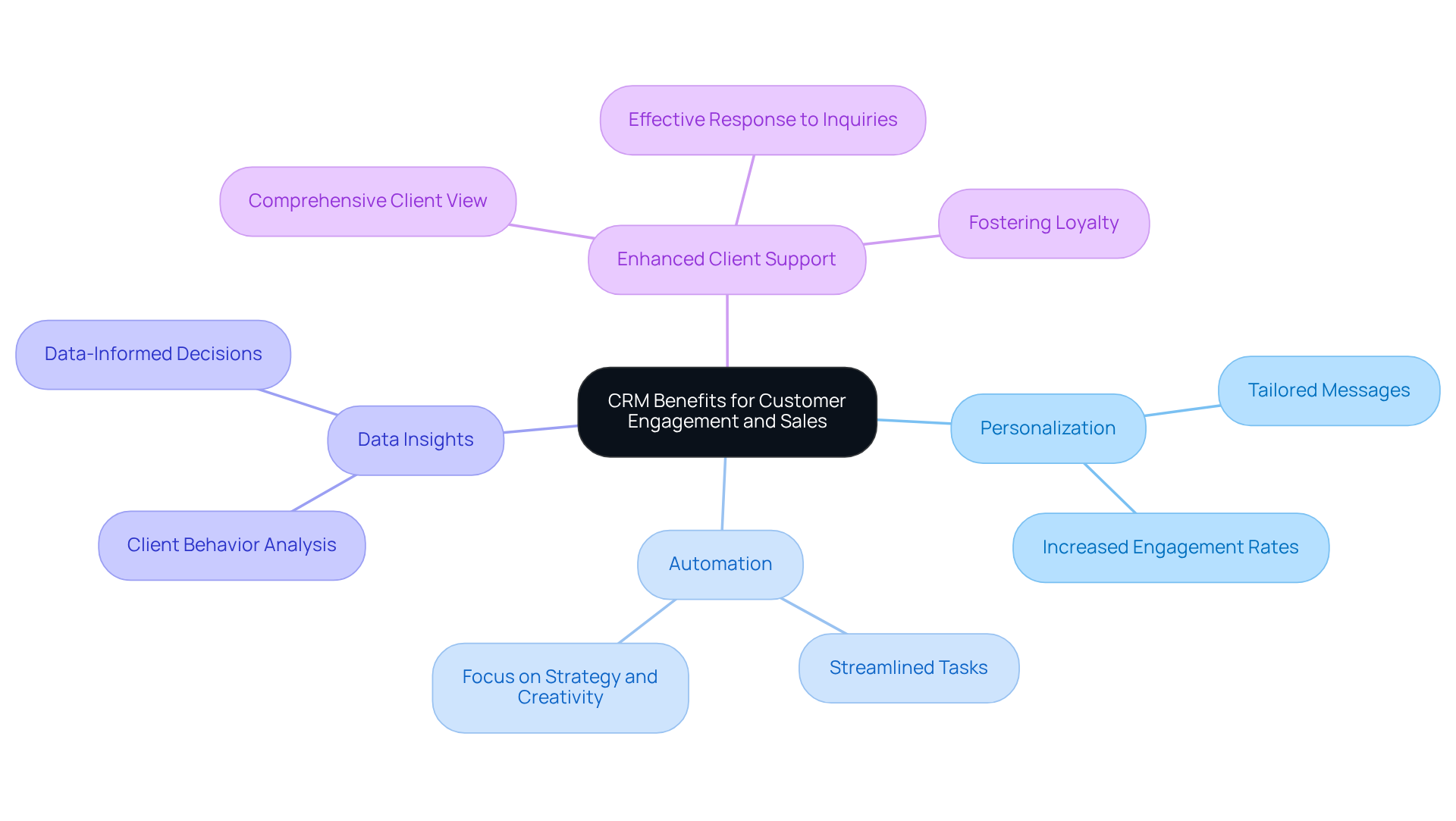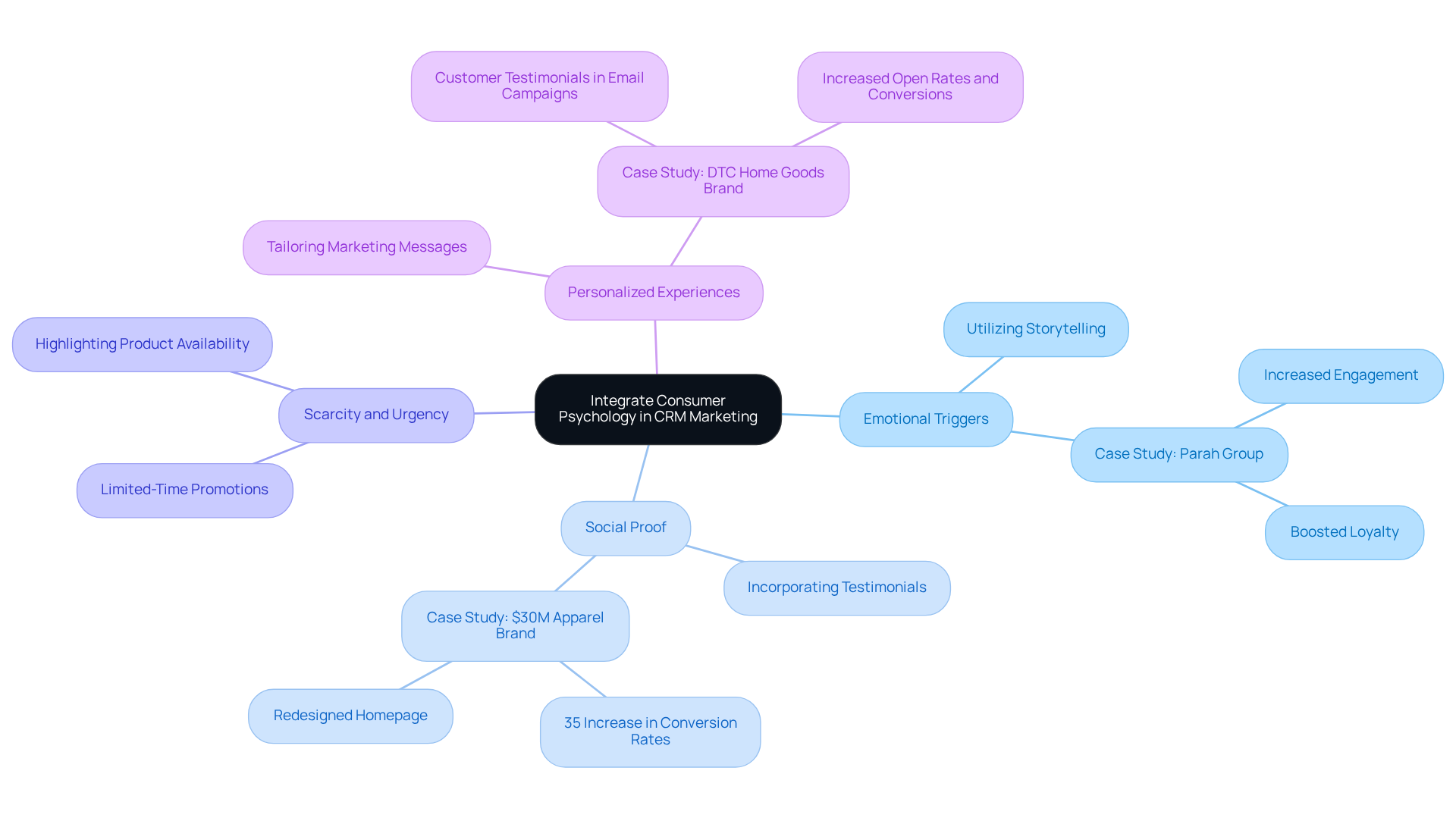
Overview
Mastering CRM marketing digital is not merely beneficial; it is essential for direct-to-consumer (DTC) brands aiming to enhance customer engagement and substantially boost sales. By leveraging personalization, automation, and data insights, brands can create more meaningful interactions with their customers. Effective CRM strategies, such as audience segmentation and the integration of consumer psychology principles, are pivotal in achieving these goals.
The implementation of these strategies can significantly improve marketing outcomes. Tailoring campaigns to meet specific client needs not only fosters loyalty but also drives repeat business, which is crucial for long-term success in the competitive DTC landscape. Data-driven insights allow brands to understand their audience better, enabling them to craft messages that resonate.
In conclusion, DTC brands must prioritize mastering CRM marketing digital. By doing so, they position themselves to not only meet but exceed customer expectations, ultimately leading to enhanced engagement and increased sales. The time to act is now—embrace these strategies to unlock the full potential of your marketing efforts.
Introduction
In the competitive landscape of direct-to-consumer (DTC) brands, forging meaningful connections with customers is not just beneficial; it is paramount. Client Relationship Management (CRM) systems emerge as vital tools, enabling companies to streamline interactions and tailor marketing strategies that resonate with individual preferences. By harnessing the power of CRM, brands can unlock personalized experiences that drive engagement and sales. However, the question remains: how can DTC companies effectively navigate the complexities of CRM marketing to capitalize on these advantages and distinguish themselves in a saturated market?
Understand CRM Systems and Their Role in Marketing
Client Relationship Management (CRM) systems serve as the cornerstone for managing interactions with both existing and prospective clients, facilitating streamlined processes, enhanced service, and increased profitability. For direct-to-consumer (DTC) companies, a robust CRM system is indispensable for monitoring customer interactions, managing sales pipelines, and analyzing customer data—essential elements for crafting effective promotional strategies.
Understanding the capabilities of CRM systems—such as data collection, segmentation, automation, and analytics—empowers companies to tailor their promotional efforts with precision. By harnessing these capabilities, DTC companies can create personalized experiences that resonate profoundly with their audience, ultimately driving higher engagement and sales.
For example, a DTC brand leveraging a CRM system can categorize its clientele based on purchasing behavior, facilitating targeted promotional campaigns that address the specific needs and preferences of distinct consumer groups. This strategic targeting not only elevates client satisfaction but also significantly enhances conversion rates, underscoring the substantial impact of CRM systems on client engagement and overall business success.
Moreover, the successful implementation of CRM requires ongoing training and support to ensure that staff can fully leverage the system's capabilities. Automation features within CRM systems streamline operational processes, minimizing manual labor and allowing teams to concentrate on strategic initiatives. Additionally, the analytics and reporting features provide invaluable insights into client behaviors and business performance, further refining marketing strategies. By avoiding common pitfalls, such as inadequate training, DTC companies can optimize the benefits of their CRM systems, securing a competitive edge in a saturated market through enhanced client satisfaction and loyalty.

Leverage CRM Benefits to Enhance Customer Engagement and Sales
CRM marketing digital systems offer significant advantages that can substantially enhance engagement and sales for DTC companies. These advantages include:
- Personalization: By analyzing client information, companies can create tailored messages that resonate with individual preferences, leading to increased engagement rates.
- Automation: CRM systems streamline repetitive tasks such as email promotions, follow-ups, and client segmentation. This efficiency in CRM marketing digital allows marketers to concentrate on strategy and creativity.
- Data Insights: With robust analytics features, CRM marketing digital systems provide valuable insights into client behavior, empowering companies to make data-informed decisions that enhance marketing effectiveness.
- Enhanced Client Support: By maintaining a comprehensive view of client interactions, companies can respond more effectively to inquiries and concerns, fostering loyalty and encouraging repeat purchases.
For example, a DTC skincare brand utilizing CRM analytics to track buyer purchase history can deliver personalized product recommendations. This approach not only leads to higher average order values but also boosts client satisfaction.

Implement Effective CRM Strategies for Measurable Marketing Success
To implement effective CRM strategies, DTC brands must adhere to the following best practices:
-
Segment Your Audience: Leverage CRM data to categorize individuals based on demographics, purchasing behavior, and engagement levels. This strategic segmentation enables targeted marketing campaigns that address the specific needs of each group.
-
Utilize Automated Campaigns: Establish automated email campaigns tailored for various client segments, such as welcome emails for new clients or re-engagement emails for those who have become inactive. Automation ensures prompt communication, significantly enhancing the client experience.
-
Regularly Analyze Data: Consistently monitor and analyze CRM data to uncover trends and adjust promotional strategies accordingly. This iterative approach in crm marketing digital allows companies to stay relevant and responsive to client needs.
-
Integrate with Other Tools: Ensure your CRM system seamlessly integrates with other marketing tools, including social media platforms and e-commerce systems, to foster a unified strategy.
For instance, a DTC clothing brand that segments its audience based on purchasing patterns can send personalized recommendations, leading to a substantial increase in conversion rates and customer loyalty.

Integrate Consumer Psychology to Optimize CRM Marketing Efforts
To enhance their CRM marketing digital efforts, DTC companies must integrate principles of consumer psychology into their strategies. This approach is not merely beneficial; it is essential for achieving significant results. Key considerations include:
-
Emotional Triggers: Identifying and leveraging emotional triggers that resonate with your audience is crucial. For instance, utilizing storytelling in marketing communications can establish a stronger bond with clients, ultimately boosting loyalty to the company. A compelling case study from Parah Group illustrates how effective emotional storytelling can engage customers, leading to increased conversions.
-
Social Proof: Incorporating testimonials and reviews into CRM communications is vital for building trust and credibility. Parah Group's case studies demonstrate that companies showcasing positive feedback can significantly enhance conversion rates. For example, a $30M apparel brand experienced a 35% increase in conversion rates after redesigning their homepage to highlight social proof and reviews, alongside gamifying the progress bar for free shipping thresholds.
-
Scarcity and Urgency: Employing scarcity strategies, such as limited-time promotions, prompts swift action from clients. By highlighting the limited availability of products, companies can drive urgency and increase conversion rates.
-
Personalized Experiences: Tailoring marketing messages based on individual client preferences and behaviors is imperative. In CRM marketing digital, personalization not only enhances engagement but also fosters a sense of belonging among clients. Parah Group's strategies, such as implementing post-purchase upsells and custom landing pages, have proven effective in maximizing profitability and improving average order values.
For instance, a DTC home goods brand that effectively utilizes customer testimonials in its email campaigns can significantly increase open rates and conversions, as potential buyers feel more confident in their purchasing decisions.

Conclusion
Mastering CRM marketing digital strategies is essential for direct-to-consumer (DTC) brands seeking to elevate customer engagement and drive sales. By effectively utilizing CRM systems, companies can streamline their marketing efforts, create personalized experiences, and ultimately foster deeper connections with their audience. This strategic approach not only enhances client satisfaction but also positions brands for sustained growth in a competitive landscape.
The article highlights several key insights, including:
- The importance of understanding CRM capabilities
- Leveraging data for targeted marketing
- Integrating consumer psychology into CRM strategies
Effective segmentation, automation of campaigns, and continuous data analysis emerge as critical components for success. Additionally, incorporating emotional triggers and social proof can significantly enhance the effectiveness of CRM marketing efforts, leading to improved conversion rates and customer loyalty.
In a rapidly evolving market, DTC brands must prioritize the implementation of effective CRM strategies. By embracing these best practices, companies can not only optimize their marketing outcomes but also cultivate lasting relationships with their customers. The integration of consumer psychology into CRM efforts further emphasizes the need for brands to resonate with their audience on a deeper level. Taking these steps will not only secure a competitive edge but also pave the way for long-term success in customer engagement and sales growth.
Frequently Asked Questions
What is the primary purpose of Client Relationship Management (CRM) systems?
CRM systems are designed to manage interactions with both existing and prospective clients, facilitating streamlined processes, enhanced service, and increased profitability.
Why are CRM systems important for direct-to-consumer (DTC) companies?
For DTC companies, a robust CRM system is essential for monitoring customer interactions, managing sales pipelines, and analyzing customer data, which are crucial for developing effective promotional strategies.
What capabilities do CRM systems offer?
CRM systems provide capabilities such as data collection, segmentation, automation, and analytics, enabling companies to tailor their promotional efforts precisely.
How can DTC companies benefit from using CRM systems?
By utilizing CRM systems, DTC companies can create personalized experiences for their audience, leading to higher engagement and increased sales through targeted promotional campaigns.
How does CRM segmentation work in practice?
A DTC brand can categorize its clientele based on purchasing behavior, allowing for targeted promotional campaigns that meet the specific needs and preferences of different consumer groups.
What role does training play in the successful implementation of CRM systems?
Ongoing training and support are crucial to ensure that staff can fully leverage the capabilities of the CRM system, optimizing its benefits for the company.
How do automation features in CRM systems help businesses?
Automation features streamline operational processes, reducing manual labor and enabling teams to focus on strategic initiatives.
What insights do analytics and reporting features of CRM systems provide?
These features offer valuable insights into client behaviors and business performance, helping to refine marketing strategies.
What common pitfalls should DTC companies avoid when implementing CRM systems?
Companies should avoid inadequate training, as it can hinder the optimization of CRM benefits and impact overall client satisfaction and loyalty.
FAQs











